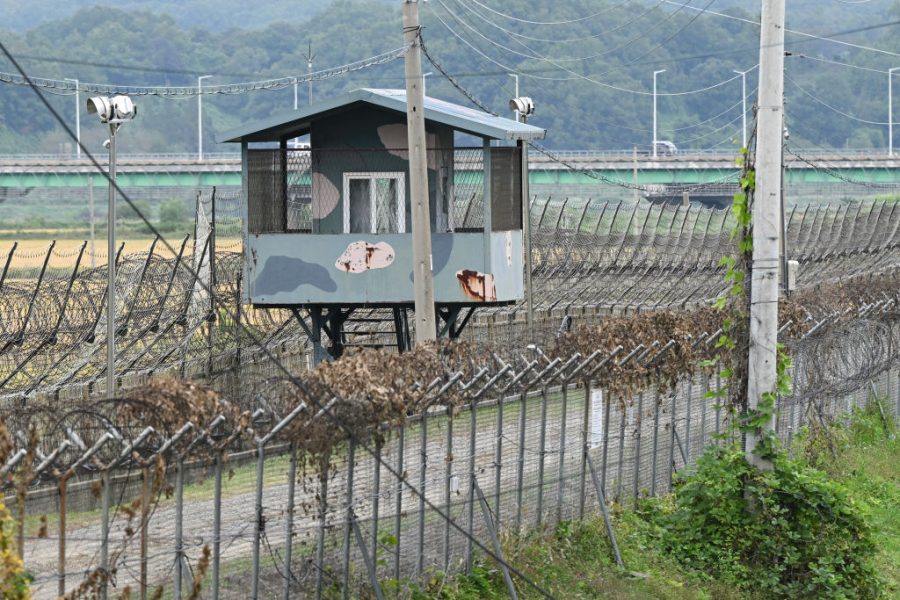On both sides of the Demilitarised Zone (DMZ) between North and South Korea, loudspeakers blasting news, music, weather reports, wailing sounds, or anti-DPRK messaging have formed a regular part of life along one of the world’s most militarised borders. Yet the South Korean government’s decision to remove these loudspeakers, which commenced on Monday, sets a worrying precedent for the future. Not only have similar gestures previously failed to ameliorate North Korea’s bad behaviour, but at a time when Pyongyang shows no desire to improve its relations with Seoul and Washington, South Korea should not be naïve in thinking that these actions will be reciprocated in kind.
North Korea has used these broadcasts as part of its strategy of brinkmanship
This week’s actions by the South Korean government follow the decision by President Lee Jae-myung, only a week after his election on 3 June, to pause the broadcasting of material from South Korean loudspeakers as part of the president’s desire for inter-Korean reconciliation. After a five-year hiatus, broadcasts resumed in June 2024, following North Korea’s notorious disbursements of thousands of balloons filled with rubbish, including human excrement, into the South.
Pyongyang’s hatred of these broadcasts is evinced in the fact that they have long termed them ‘acts of war’. Nevertheless, the dissemination of outside information, including anti-North Korean messaging, from the capitalist South to the communist North offers a small but important strategy to expose the North Korean people, both soldiers on the border and across the country, to the truth. Doing so ultimately undermines the legitimacy of the Kim regime, which has been built on deception and lies, one after another.
Those on the left will counter that the fact that North Korea suspended its own loudspeaker broadcasts almost immediately after the South bodes positively for inter-Korean relations. But such a conclusion reeks of naivety. After all, North Korea has used these broadcasts, together with other forms of psychological warfare, as part of its strategy of brinkmanship to gain concessions from the international community without giving anything in return. Over the past two decades, the intermittent nature of broadcasts and leaflets carrying anti-DPRK messages from South to North has done little to improve North Korea’s delinquent behaviour.
In 2004, a deal between the two Koreas saw the suspension of broadcasts, only to be resumed by South Korea eleven years later, in August 2015, after two South Korean soldiers were injured by a North Korean landmine along the Demilitarised Zone. In response, North Korea retaliated with artillery fire. Though they were halted later in the year, broadcasts restarted in September 2016 after North Korea conducted its fifth nuclear test. In April 2018, days before the infamous summit between then-South Korean President Moon Jae-in and Kim Jong Un, Seoul once again froze their broadcasts – supported by the United States – and called on activist groups to cease the distribution of balloons carrying anti-DPRK leaflets into North Korea. North Korea’s behaviour did not change one iota: in fact, it only worsened.
Whilst noting this history, we must not forget that, in addition to its rapid proliferation of nuclear weapons and delivery systems and its ever-expanding cooperation with Russia, the problem of North Korea also comprises a longstanding human rights issue. Much akin to its nuclear programme, the Kim regime – one of the worst human rights violators in the world – has refused to respect the basic human rights of its people. Under the rule of Kim Jong Un, social control has only increased, and freedom of expression and thought has been further suppressed.
The nearly four-year closure of the country’s borders from January 2020, on account of Covid, offered Kim Jong Un a convenient excuse to crack down on what he has termed a ‘vicious cancer’ – namely, ‘reactionary’ thought and behaviour. The draconian ‘anti-reactionary thought law’, enacted in 2020, sentences those caught possessing, listening to, and watching South Korean films and music – including K-pop – to over ten years of hard labour. Those found to be importing or disseminating outside information can be subjected to the death penalty. For Kim Jong Un, the information virus, comprising ‘rotten ideology and the culture of hostile forces’, is far more potent than any pandemic.
Harrowing stories from North Korean defectors highlight how information about the outside world is one important and decisive factor in their decision to leave the hermit kingdom. Nevertheless, the decision by the South Korean National Intelligence Service to suspend all its radio broadcasts into Pyongyang was both ill thought-through and is unlikely to pay dividends. How, therefore, will the North Korean people – which the South Korean constitution deems to be South Korean citizens – access outside information, which will open their minds to a world which their despotic regime is so anxious to prevent them from accessing?
At the end of July, Kim Jong Un – the sister of Kim Jong Un – responded to South Korea’s suspension of loudspeaker broadcasts with a pithy axiom: ‘The year 2025 is neither 2018 nor 2019’. Pyongyang’s stance is clear: in North Korea’s eyes, South Korea is an enemy for life, irrespective of who is holding power in the Land of the Morning Calm. Even if the enemy yields one foot, North Korea will not yield an inch.
